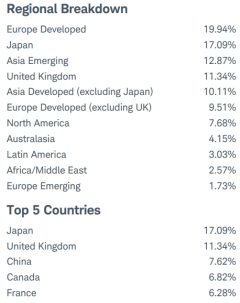We have had this discussion before. "50% of my stock portfolio to be under accounting rules in place in China, Hong Kong and Brazil or Japan" is impossible in a total international fund. Here is VGTSX.
Note that Europe, the UK, and North America account for about 50% of the holdings and China is a single digit percent. Japan is significant but I don't know of any reason to be concerned about Japanese accounting.
If VGTSX doesn't assuage your paranoia, look at an EAFE index fund where you will have an even smaller number of emerging market investments where you might be paranoid.
I have asked before but don't remember the answer. Have you traveled internationally? Roughly how many countries? We've been to about 40 countries and, from that experience, your concerns are not even a radar blip for me.

